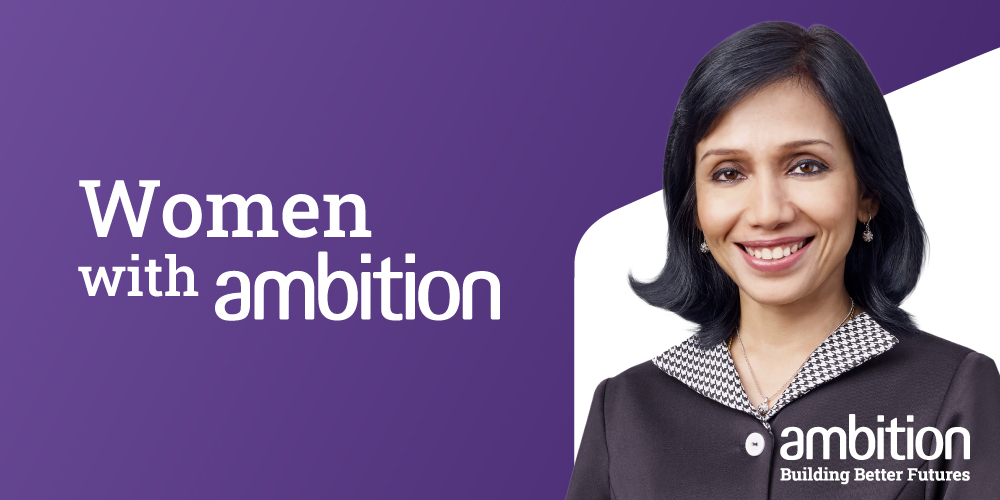Please beware of recruitment scams that are currently targeting jobseekers. Click here for further advice.

Women with Ambition: Up Close with Tinku Gupta
When we look at the tech leaders in financial services firms, women make up the minority of this group. There is still a long road ahead as we work towards having greater representation in these leadership roles.
In this week’s edition of our Women with Ambition series, Tinku Gupta shares her experience as Senior Managing Director, Chief Technology Officer at Singapore Exchange (SGX). Read on to find out her advice for aspiring female leaders, her personal career journey and her insights as a leader during the current COVID-19 pandemic.
1. JP Morgan Chase, Citibank Inc. and Mastercard are just some of the companies who have adjusted the gender pay gap to close to one percent. Can you share examples of equality practices that your firm looks closely at?
Singapore Exchange (SGX) is an Equal Opportunity employer. We operate in a global environment where there is intense resource and talent competition across borders. We firmly believe that the success of the company is driven by the diverse backgrounds, knowledge and perspectives of our people. To support our fair employment practices, we have well-established policies that all employees in SGX must abide by:
a) Compensation and Benefits Policy - that is aligned with "equal pay for equal work". It takes into consideration the individual's skills, experience, knowledge, ability to perform the job, and role requirements.
b) Non-Discrimination Policy - that prevents discrimination based on race, gender, religion, age, national origin, citizenship status or disability.
c) Code of Conducts Policy - that prevents Employees from creating a hostile work environment or undermine the dignity of any individual.
2. If you could give one piece of advice to your younger self, what would that be?
Do not surround yourself with the "CAN I do it" question mark. Flip the words around, "I CAN do it", and put your best foot forward in accepting new challenges.
3. Who inspires you and why?
Melinda Gates, as a technologist, philanthropist and an author, she has been encouraging many women in the computing field for decades. She is a great source of inspiration for me.
4. What are some strategies that can help women achieve a more prominent role in theirorganisations?
There are still very few women in leadership positions for tech roles in financial services firms where technology is a crucial enabler.
Women need to do more to reach out to senior women through social media and networking forums and learn from each other and help each other grow.
5. As a female leader, what has been the most significant barrier in your career?
I have not met with any significant barriers, be it personally or professionally in my career. However, I have heard this sentiment from many other women on barriers they face.
I will advise them to read and research more on emotional agility. I use this tool regularly - it teaches you to project confidence and damp down any negativity bubbling inside you.
6.In light of the COVID-19 pandemic, what are 2 pressing challenges that your organisation currently faces? What steps are being taken to mitigate these challenges?
Most organisations are facing similar challenges and they are few. If I have to pick 2, they are:
a) How to replicate emotional connection, water cooler type talks in the virtual world with similar intensity as it is in the physical world?
b) No matter how much organisations are doing on employee experience and digital workplaces, staff still have worries on Fear of Missing Out (FOMO) particularly around performance reviews and career progression.
We are staying very close to these signals through surveys, staff dialogues, and continuous communication so that solutions are bespoke and driven by employees' feedback.
7. With most teams working virtually, how have you adjusted to this change and ensure there is transparent and effective communication with your team?
The element of trust plays a big part when we have teams working from home. However, out of sight does not mean out of mind. Understanding the needs and concerns of our remote team is important and this is done through frequent and regular virtual meetings and setting accurate expectations. On a monthly basis, we run 2 virtual Technology Town Halls to keep everyone updated on the recent progress of the organisation. Company-level huddles and town halls are also done every two weeks, and we are encouraged by the higher participation rate compared to what it used to be when most people used to work from the office.
8. How do you see businesses evolving after the pandemic subsides and what role should female leaders play during this period of transition?
Traditionally, we imagine a masculine superhero leader; someone who is strong, has firm conviction and who is able to lead with a singular force. Someone to lead companies through troubled times. However, the COVID-19 pandemic is different from most organisational crises and hence a different type of leadership will be required for companies to sail through these challenging times. In this crisis, companies need leaders who make decisions based on facts and who are not afraid to demonstrate vulnerability and empathy to the employees.
One of the key priorities of companies is to ensure the safety and well-being of their employees. During the initial phase, physical safety is important. Hence you will likely see a change in the operating model, from face-to-face service to contactless service, from manual processes to electronic transactions, from on-site support to remote operations.
Employees are also concerned about their security. This is where leaders can play an important part, by providing ongoing, honest communication with employees. Female leaders can play their part by listening and paying attention to the more vulnerable employees, creating connections and providing support for employees with varying needs.





![[Blog] 5 Strategies To Attract & Retain Finance & Accounting Talent In Singapore](https://image-assets.eu-2.volcanic.cloud/api/v1/assets/images/38badd1de52da89b5fa73aebe747532e?size=480x500%3E)

